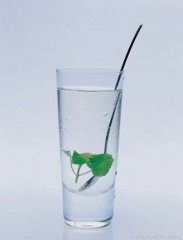英语听力文摘 English Digest 354、致命的脱水
时间:2019-02-24 作者:英语课 分类:英语听力文摘 English Digest
Dehydration 1
脱水
If I were to stop drinking water right now, how long could I live?
There are different factors involved here. A human being isn’t an automobile 2 which needs a certain amount of gas. There are conditions under which a person could die of dehydration within a single day, and other conditions whereby a person might live for over a week. It’s unlikely, though, anyone could go much beyond that.
Water comes into our systems not just from drinking but from eating as well. It goes out of us through urine, through sweat, and even through exhaling 3. Ever notice the fog you can make on a window by breathing on it? That’s water vapor 4 leaving your body.
The biggest reason it’s bad to lose too much water is that the actual volume of your blood goes down. When blood volume goes down, blood pressure goes down. As blood pressure goes down, body heat goes up, because your blood helps regulate your core body temperature. Without enough blood, you can’t cool off. Pretty soon you overheat.
So various factors, from eating to circulatory health to the ambient temperature, play a part in how long you could go without water. Probably the biggest factor, though, is simply age: young people are much more likely to overheat faster than adults, which is why it’s especially important to keep an eye on the little ones on hot summer days.
如果从现在开始停止喝水,能活多久呢?
这涉及到很多方面的因素。人不是汽车,只需要一定量的汽油就行了。有时候,人体脱水一天便会死亡;但是有时,人体可以在脱水的情况下存活超过一个周。但是,任何人在脱水的情况下都不能长久的生存。
我们的身体不仅通过喝水获得水,还通过吃饭。我们的身体通过排尿、出汗,甚至是呼吸将水排出体外。有没有注意到自己往窗户上呼气形成的水雾呢?那就是从体内排出的水蒸汽。
人体不能流失过多水分的最重要原因是因为会导致人体实际血容量减少。当血容量减少时血压也会随之降低。由于血液有助于调节人体温度,因此当血容量减少时,体温便会升高。如果血容量不足,人体便无法冷下来,很快,就会热得让人受不了。
因此,从饮食到循环系统的健康再到环境温度,众多的因素决定了一个人在脱水的情况下能存活多久。但是,可能最重要的因素只是简简单单的——年龄:年轻人比成年人更快更容易过热,这也就是为什么在炎热的夏天要特别留神照顾小孩子了。
Note: exhale vt. 呼出
- He died from severe dehydration.他死于严重脱水。
- The eyes are often retracted from dehydration.眼睛常因脱水而凹陷。
- He is repairing the brake lever of an automobile.他正在修理汽车的刹车杆。
- The automobile slowed down to go around the curves in the road.汽车在路上转弯时放慢了速度。
- Take a deep breath inhaling slowly and exhaling slowly. 深呼吸,慢慢吸进,慢慢呼出。 来自互联网
- Unclasp your hands and return to the original position while exhaling. 呼气并松开双手恢复到原位。 来自互联网
